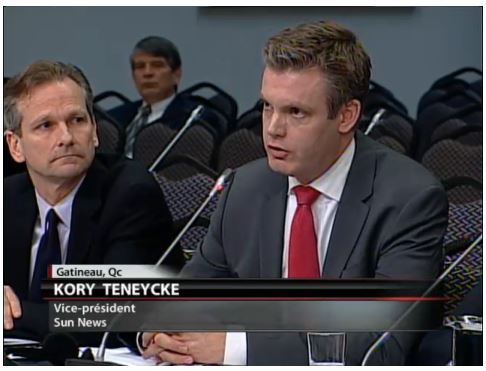
GATINEAU – Quebecor Media’s Sun News compared itself to a wireless new entrant Tuesday saying it needs to benefit from a regulatory mechanism in order for it to compete against the established news players, company executives argued before the CRTC on the first day of the Commission’s 9(1)(h) hearing.
Kory Teneycke, vice-president of Sun News, told the commissioners under questioning that the news service is suffering from a market he believes isn’t functioning properly and is open to abuse by some of its competitors. He referred to the 2008 advanced wireless spectrum auction as an instance where the government recognized the market wasn’t working and took steps to ensure new entrants could gain a foothold, granting a set aside of spectrum for new wireless companies.
“What you’re seeing in terms of both pricing and access to the market is an attempt to kill new entrants in the crib,” Teneycke said, adding that to have a properly functioning marketplace just as the government did with the spectrum auction, “there needs to be a mechanism by which new entrants can come into the marketplace.”
“We’re here as a new entrant because we see an opportunity in the market to change that to provide Canadian content that Canadians want to watch. But in order to do that, we have to be able to put the product in front of Canadians and our competitors have no interest in seeing that happen.”
Sun News said it should be treated the same as the other all news channels and get mandatory carriage on basic. The channel is available on most Canadian BDUs as a discretionary service.
“We’re here because Sun News has not been getting a fair shake. From stratospheric channel placement to limited market access, Canada’s cable and satellite distributors have taken the choice to watch Canadian programming away from consumers,” Luc Lavoie, responsible for development with Sun News, said after a flashy news story style video that constituted the majority of the company’s opening remarks.
Teneycke (pictured in a screen cap from www.cpac.ca) noted that that if CBC’s and CTV’s all news channels were able to benefit from mandatory carriage, so should Sun News.
“We believe the appropriate path and the path that frankly CBC Newsworld and CTV News channel benefit from is a broadcast distribution licence that ensures that it is distributed broadly and at a fair price. And if it was good enough for our competitors, we believe it’s good enough for us.”

Situations where Sun News has been bumped from prime dial positions from the likes of Rogers Communications and Shaw Communications has angered the company. It suggested that these are clearly cases of undue preference.
CRTC chair Jean-Pierre Blais jumped on the company’s contention that it has been subjected to undue preference asking why the company hasn’t pursued this avenue, if they believe that really is the case.
Teneycke said that undue preference works in instances where there is a single case whereas Sun News has experienced it with almost all distributors.
“An undue preference complaint serves you very well if you have one distributor who’s making a fairly narrow violation. We chose not to go that route corporately because the problem that we’re facing is much broader. We’re essentially dealing with a version of this with almost every distributor,” he responded.
Lavoie added that in the case where Rogers took over channel 15 on the dial for its City News channel after the previous over the air Sun TV channel returned its licence to the Commission, it was technically undue preference. “Therefore channel 15 probably, legally, technically speaking became available, there was no obligation on the part of Rogers to go ahead and keep broadcasting us on channel 15. So, an undue preference complaint would probably have been rejected. That was the legal opinion we were given,” he said.
At one point during the questions, Blais wondered a “must offer” order would be enough for the company, rather than a direct placement on basic cable. Teneycke responded by saying that having Sun News on a must offer basis wouldn’t change much.
“They’re offering it at a small fraction of what they’re paying themselves for their own news channel of a similar nature,” he complained. “They’re offering it at a price that is a small fraction of what the average subscription price is for a Canadian all news channel in the English Canadian market. They’re offering it in upper tier packages,” he said. “They’re putting it on a basis that is inferior to what other channels within that environment have had historically and have today and what they’re offering to their own channels. So I think if we were to have must offer, you would see very little difference in the marketplace than what we do right now.”
Sun News maintained throughout its appearance that Canadians are looking for more choice in their news programming services. Blais acknowledged that the company’s application showed this sentiment, but questioned why Sun News based its entire application on this, yet failed to ask Canadian about whether they would pay for it until much later on in the process.
“It’s one thing to say you want access, you want choice, but if it comes at a price, one really should ask that question,” Blais said. “I think it’s a bit of a leap to suggest they’re willing to pay as part of the basic an increase of $0.18 cents per month.”
Teneycke noted that the company did ask that question in its reply comments, adding that it was also asked in Sun News original 2010 application. “So we feel like it’s already on the record,” he said.
Coverage of the 9(1)(h) hearing continues tomorrow.


